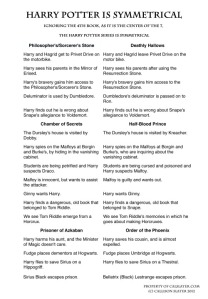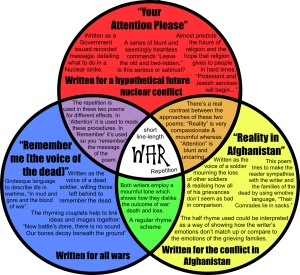The novel ‘Birdsong’ by Sebastian Faulks focuses on WW1 and its effect on society through the journey of the protagonist Stephen Wraysford and his family. The novel is structured around three time periods and Faulks uses these time changes and the characters in each to show the differences that the war made. The first section is set in France before the war and introduces Stephen and his affair with Isabelle. This whole section shows how little rights women had, especially shown in Isabelle’s unhappy and abusive marriage to Azaire. The next section contains the war and explores trench warfare, tunnelling and going over the top. The final section is set in 1970s Britain and concerns Stephen’s granddaughter Elizabeth who is researching WW1. This last section truly shows the change in society and women’s rights as Elizabeth is free to have a child despite being single.
The novel opens with a lush and Romantic description of Amiens and the “river Somme”, showing the nature that will soon be destroyed by the war. Faulks describes passages and tunnels multiple times in the opening paragraphs, giving the ideas of the tunnels of WW1 from the very beginning, “the river Somme broke into small canals”, “unregarded passageways”. It could be argued that Faulks does this to show how the actions of the society in “France 1910” caused the war. The natural elements of the description give ideas of the Garden of Eden, and thus you could see the war as symbolising the fall of man.
Houses are often used as outward manifestations of the family that lives within them in literature and the Azaire house in Birdsong is no different. The house is described in a gothic manner as having a “strong, formal front” with “iron railings”, this sturdy exterior shows that the family is respectable however the iron railings could be seen as a metaphor for Azaire trapping Isabelle within and seeing her as a possession. Isabelle is an obviously beautiful trophy wife, her beauty not shown through her husband’s admiration but Stephen’s curious thoughts about her, “her white hands”, “membrane of her lower lip”. Isabelle is a commodity to Azaire, her marriage was “sold” to Azaire by her “father” and he objectifies her, choosing to “display her to his friends”. This shows the patriarchal nature and capitalist views of Victorian society.
Azaire is not only an abusive husband but an exploitative business owner, representing the capitalist businessmen who contributed to causing WW1. We can see a socialist point of view in the character of Meyraux who plainly describes the problem with society in his argument with Azaire, “What the industry needs is… a less mean and timid attitude on the part of the owners.” Faulks links capitalism to war by having Azaire talk about his workforce using the semantic field of war, “we need to retrench”. In both war and industry the men are used merely as pawns to advantage those higher up in society.
The first things we encounter in “France 1916” are the tunnels, mirroring the opening passage of the novel, “forty-five feet underground”. Faulks uses the language of industry in this section “mechanical” “grinding” to show how the soldiers were merely cogs in a mechanism. Faulks introduces the men, giving them names and a back-story, allowing the reader to get to know them so that the reader empathises with Stephen’s pain when they die. He creates images using simplistic language with very little emotion to brutally describe the horrors of their injuries; “his head was cut away in section… ragged edges of skull from which the remains of his brain were dropping.”
Stephen doesn’t see war like the officials do, he almost poses as the voice of reason, “Every one of the men we’ve killed is someone’s son”. Faulks uses him to voice the views of many soldiers, including Wilfred Owen, “No one in England knows what this is like”. That thought is a theme of the whole novel, confirmed through Elizabeth’s naivety about the casualties of the war in the 1970s. The only outcome of war is the questioning of morality, which is exactly what Stephen does when talking to Wraysford, he expresses his newly damaged mindset weaved with both his opinion and societal opinions of war, “This is not a war, this is an exploration of how far men can be degraded”. He even speaks the truth when talking to his hopelessly optimistic superiors who believe that the battle will be “over at dawn”, Stephen thinks logically and questions both the “terrain” and the actions of the “enemy”.
When the soldiers wait for the command Faulks uses short sentences and phrases, “They were almost there. Stephen on his knees, some men taking photographs from their pockets, kissing the faces of their wives and children. Hunt telling foul jokes.” This slows down time and shows the panic of the anticipation. He uses short sentences again in the battle itself, this time to speed the action up, “It had not been cut.” Faulks personifies nature, “soil spat”, suggesting that nature is fighting back and joining the battle, a similar idea to those in “Futility”. The dehumanisation of soldiers is shown very specifically in the battle as the soldiers are described as “primitive dolls” and “humps of khaki”, giving the impression that they are less than human, dispensable. Faulks uses several semantic fields in the battle, this mix of semantic fields adds to the eclectic and crazed nature of the war. He uses the semantic field of machinery, “clog the progress”; horror, “his nose dangled”; and when Stephen survives the Romantic field of nature, “There are trees beyond the noise, and down in the valley is the fish-filled river.” Faulks later mixes the semantic field of butchery, “pink skin” “small joints of meat” with the semantic field of drowning, “wave breaking” “undertow of fear”. The semantic field of butchery makes the reader see that the soldiers were treated like animals, simply dying for a higher purpose. The semantic field of drowning insinuates that either the men were drowning in the noise of the war “sound of shellfire” “explosion”, or even that they were drowning in the bodies, unable to dispose of them all.
The sections set after the war concern Elizabeth, Stephen’s granddaughter who is both coping with being pregnant with a married man and searching for her grandfather’s story. Part 3 unsurprisingly starts in the “tunnel of the underground”. The motif of introducing each timeframe using tunnels links all three, showing how the war affected all. Elizabeth visits France to try and find out what the war is like and is surprised by the scale and horror of it all, the “endless writing as though the surface of the sky had been papered in footnotes”. That image gives the reader an insight into Elizabeth’s head and the unfathomable number of names on the memorial. Because the reader has just got a taste of WW1 through ‘Part 2’ we sympathise with Elizabeth, however the tone of these sections seems ironic because we know we’ll never experience it like the soldiers did, which is why “My God, nobody told me” rings true with the readers.
Elizabeth gets impregnated by a married man, and the fact that she can do so and have the baby shows how the world has changed. Before the war this would be frowned upon by Victorian society but not even her mother minds now. The only one who’s unsure is Robert, her lover, and the novel ends with him finally accepting the thought of another baby and being overwhelmed with “great happiness”. A feminist reader would be glad of this ending as it truly shows that despite the deaths caused by World War 1 it propelled society into the future and promoted freedom. Faulks shows in this final section what the men in WW1 fought for, not for patriotic values or revenge but for the future.





